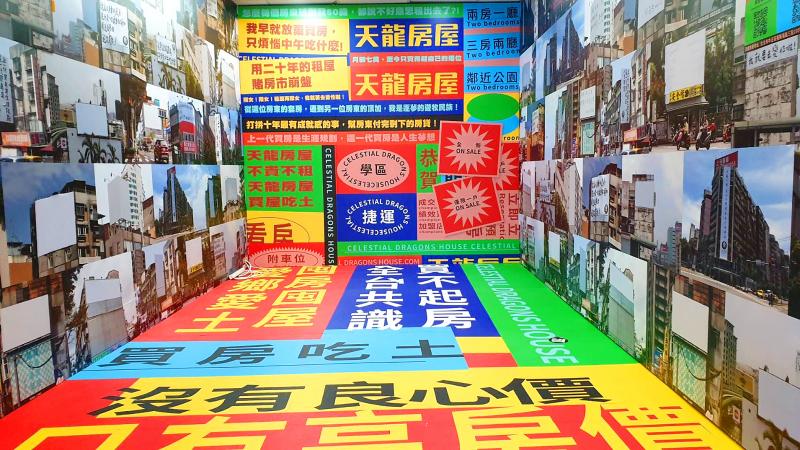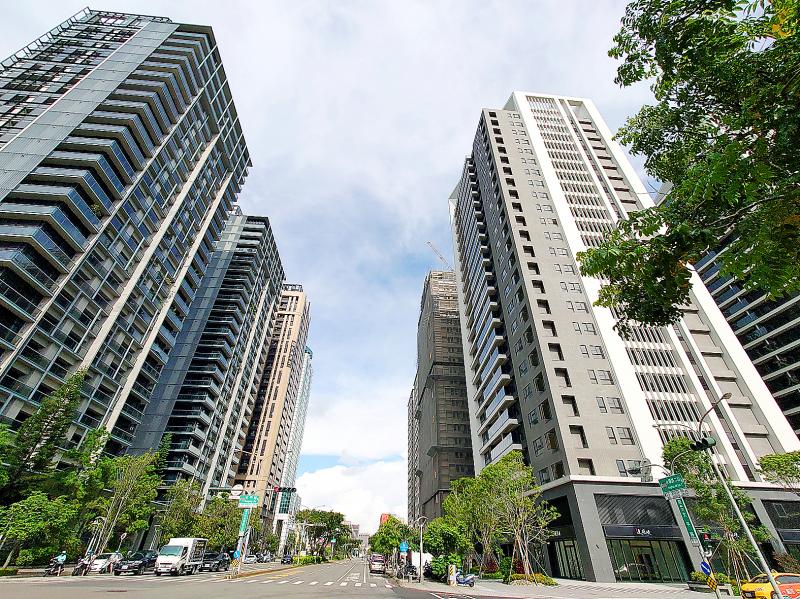In China they are “lying flat.” In America, they are undergoing the Great Resignation. In Taiwan, they are still living with their parents until they are 40, hoping somehow to buy a house.
As if to further torment those living with their parents, late last month Taiwan’s largest construction company group, the Pau Jar Group (寶佳機構), responsible for 15,000 to 20,000 new homes every year, announced that it was raising new home prices by 30 to 40 percent. The company said this was in response to the hot market, cost inflation and continued low interest rates.
The national housing bubble, striding firmly into its second decade with no end in sight, is fueled by the tax reductions and “reforms” that took place under the Ma Ying-jeou (馬英九) administration beginning in 2009: the low interest rates, Taiwanese repatriating money from abroad, low land taxes and the lack of taxes on the wealthy. It has now spread all over the island, with a recent spike in Tainan garnering much media attention.

Photo courtesy of Housing Movement
Every marker tells the same story: stats on rising income inequality, blunted only slightly by the recent rises in wages, hide a terrifying story of ever increasing wealth concentration. The bottom 50 percent of Taiwanese own around 6 percent of the nation’s wealth, a figure largely unchanged since 1995, according to the World Income Database, run by famed economic writer Thomas Piketty and others.
RISING INEQUALITY
Two years ago the number of billionaires in Taiwan hit 40. In 2009, there were just 5. In 2015, according to an Aspire Lifestyles report cited in the Taipei Times, the number of people worth over US$1 million grew 11.8 percent in a single year.

Photo: Hung Jui-chin, Taipei Times
This wealth is driving a massive speculative boom that is sparking stupendous rises in housing prices. A Commonwealth (天下) piece on the issue out last month reported the results of their analysis of 70,000 housing deals around the nation showing that prices in the six metropolitan areas rose 30 percent in the last seven quarters (not even two years!). What would you make in the stock market or in interest on a savings account?
Congratulations: for many people (read: voters), that pile of money they’ve saved just lost 30 percent of its purchasing power in two years. Note that Taiwan’s high savings rates help drive the bubble: if people are saving money to buy a house, they’re pushing up the prices they’re saving to meet. Run faster on that wheel, hamster.
Another pernicious effect: I know people who own homes but can’t sell them to cash in, because they fear they will not be able to afford a similar house in the same area near their parents or their job, given the speed of price rises.
This spreading blight of speculative wealth isn’t just a brutal social and generational crisis. It’s a vital national security issue.
The billions in wealth parked in real estate earn little for the government, because the government taxes them so lightly. That massive pool of wealth provides few jobs (construction is just 2 to 3 percent of GDP though it looms large in local politics), generates no R&D, and creates no domestic market for new domestic technology, such as solarization. Stupidly, the government does not regulate for that, either.
Because this wealth neither consumes nor creates, it does not support a sector that drives rising living standards, such as manufacturing, nor does it create demand for technology products from firms that also make military products. Since it pays few taxes, it does not help the government purchase military technology from abroad. It adds no new skills to Taiwan’s existing capacities.
DEMOGRAPHIC CRISIS
Another national security issue is Taiwan’s demographic crisis. Taiwan is already heavily overbuilt and yet its population is stagnant. Where will the demand come from when the population starts steadily falling sometime in the next decade?
But, the reader responds, the government has finally released some policies that are supposedly designed to give migrant workers a path to residency, even citizenship. Suppose we liberalize and give immigrants a rapid, sure path to citizenship: how on earth are they going buy homes and establish themselves, given that most of them will be working in service and factory jobs?
They will merely become so many more hamsters on the wheel, permanent renters in a permanent underclass, a recipe for social divides built on racism and resentment. News about the housing issue will travel along the social networks of potential immigrants, directing them elsewhere.
If new immigrants are granted social housing, locals will complain that they are pampered and taking resources that were earned by others. Meanwhile the wealthy will say to the urban working class that these new immigrants are stealing their jobs, a proven recipe for right-wing success in dividing society.
The demographics are inexorable. At some point in the next decade, given our falling population, there will not be enough buyers to support demand for new housing, and the value of that real estate wealth will fall. Or it could happen at any moment, if investors decide to send their money elsewhere.
The growing social divide between the small group of haves protected by our neoliberal government, and the have-nots who work and pay taxes, is a national security issue, because it is politically destabilizing.
It creates a group of wealthy who see the nation as little more than a combination ATM and game preserve, and a group of workers who get little in return for the long hours of work. Proponents of inevitable housing market collapse and inevitable housing market growth can unite: it is politically destabilizing either way.
SOCIETAL BACKLASH
Modern history is replete with examples of housing issues driving political instability and social crisis. Many of the factors at play in Taiwan are at play in these crises. In Brazil a gaping income inequality in the cities, combined with real estate speculation, has created a “housing shortage” that is in reality a shortage of affordable housing. In Spain the political parties are struggling to deal with high rents and a “shortage” of housing in a nation that leads Europe in empty homes. Some are proposing building more social housing. Egypt doubles China in housing construction per capita, leading the world, but 100 million Egyptians cannot afford homes despite the massive surplus of housing, continuing a crisis that dates back to the 1940s. A leading expert on it blames neoliberal deregulation and crony capitalism for the current round of problems.
Sound familiar? We’ve already had a round of protests about housing prices with the 50,000 who turned out for the “Snails without Shells” in 1989. What’s coming could dwarf that.
Perhaps Taiwan’s young will continue to retreat into their worlds of video games, cheap food, and dreams of being a Youtube influencer. But for all the accusations of laziness, the current generation is as Taiwanese as all the previous generations of protesters, rebels and resisters, the descendants of ornery folks who offered the Qing an uprising every three years and a rebellion every five.
What will Taiwan’s young do as it increasingly sinks in that no matter how fast they run, they will never catch up? Lie flat? Greatly Resign? Protest in the streets? Vote for any political party of any stripe that promises to do something about the issue? Reconcile themselves to a China invasion if it will sink housing prices?
Who can say? But the nation’s political parties need to address this with a resolute set of tax and land policies, because the alternative is a permanent, destabilizing, divisive, society-wide crisis.
Notes from Central Taiwan is a column written by long-term resident Michael Turton, who provides incisive commentary informed by three decades of living in and writing about his adoptive country. The views expressed here are his own.

That US assistance was a model for Taiwan’s spectacular development success was early recognized by policymakers and analysts. In a report to the US Congress for the fiscal year 1962, former President John F. Kennedy noted Taiwan’s “rapid economic growth,” was “producing a substantial net gain in living.” Kennedy had a stake in Taiwan’s achievements and the US’ official development assistance (ODA) in general: In September 1961, his entreaty to make the 1960s a “decade of development,” and an accompanying proposal for dedicated legislation to this end, had been formalized by congressional passage of the Foreign Assistance Act. Two

Despite the intense sunshine, we were hardly breaking a sweat as we cruised along the flat, dedicated bike lane, well protected from the heat by a canopy of trees. The electric assist on the bikes likely made a difference, too. Far removed from the bustle and noise of the Taichung traffic, we admired the serene rural scenery, making our way over rivers, alongside rice paddies and through pear orchards. Our route for the day covered two bike paths that connect in Fengyuan District (豐原) and are best done together. The Hou-Feng Bike Path (后豐鐵馬道) runs southward from Houli District (后里) while the

Mirror mirror on the wall, what’s the fairest Disney live-action remake of them all? Wait, mirror. Hold on a second. Maybe choosing from the likes of Alice in Wonderland (2010), Mulan (2020) and The Lion King (2019) isn’t such a good idea. Mirror, on second thought, what’s on Netflix? Even the most devoted fans would have to acknowledge that these have not been the most illustrious illustrations of Disney magic. At their best (Pete’s Dragon? Cinderella?) they breathe life into old classics that could use a little updating. At their worst, well, blue Will Smith. Given the rapacious rate of remakes in modern

March 31 to April 6 On May 13, 1950, National Taiwan University Hospital otolaryngologist Su You-peng (蘇友鵬) was summoned to the director’s office. He thought someone had complained about him practicing the violin at night, but when he entered the room, he knew something was terribly wrong. He saw several burly men who appeared to be government secret agents, and three other resident doctors: internist Hsu Chiang (許強), dermatologist Hu Pao-chen (胡寶珍) and ophthalmologist Hu Hsin-lin (胡鑫麟). They were handcuffed, herded onto two jeeps and taken to the Secrecy Bureau (保密局) for questioning. Su was still in his doctor’s robes at